YB Dato’ Sri Hajah Nancy binti Haji Shukri is no stranger to Cabinet-level posts. She was the Minister in the Prime Minister’s Department (Legal Affairs Division) (2013-2016) as well as the Minister of Tourism, Arts and Culture (2020-2022) before being appointed as Minister of Women, Family and Community Development in December 2022.
Unlike her previous experiences, however, her latest portfolio demands the need to be emotionally and empathetically engaging.
This is because the Ministry of Women, Family and Community Development (Kementerian Pembangunan Wanita, Keluarga dan Masyarakat; KPWKM) takes account of the people and their well-being – from the moment they were born until the time they pass on.
“People’s expectations (towards the ministry) are really high, so I have to adapt to the needs of those under our target groups,” she says in an interview with RAKAN Sarawak.
Adapting, she relates, in terms of understanding the roles, functions and procedures of KPWKM and agencies under its purview (Table 1) to identify and address areas that require improvements so that all entities are able to deliver their services better.
| AGENCIES UNDER KPWKM |
| Jabatan Kebajikan MasyarakatJabatan Pembangunan WanitaLembaga Penduduk dan Pembangunan Keluarga NegaraInstitut Sosial MalaysiaYayasan Kebajikan NegaraLembaga Kaunselor Malaysia |
Table 1: Agencies and departments under the purview of KPWKM. Source: https://www.kpwkm.gov.my/kpwkm/index.php?r=portal/index
More crucially, she has been paying greater attention to cases and socio-economic challenges affecting the ministry’s target groups such as children, women, the elderly and persons with disabilities (orang kurang upaya; OKU), and finding ways to tackle them effectively.
With children, for example, those who have been abandoned, neglected or abused are provided care, protection, rehabilitation and development services by KPWKM through the Children’s Division under Jabatan Kebajikan Masyarakat (JKM).
It is a scope, Dato’ Sri Nancy notes, that is already wide-ranging in itself. This is before even considering numerous other aspects of other target groups.
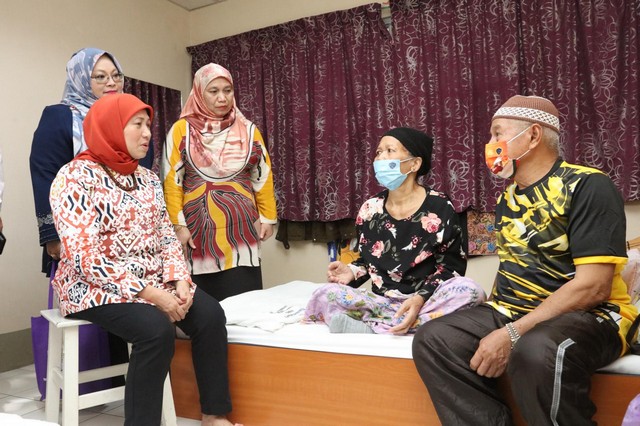
Leading the ministry is a position that she candidly states she has “never been looking forward to”, given the weight of responsibility it involves. Still, in spite of the heavy lifting to guarantee social development in Malaysia, she remains steadfast in facing such daunting task.
“That’s why for me to those who have held this position before, I salute them. I am very grateful to those who have given their best in contributing to this ministry.
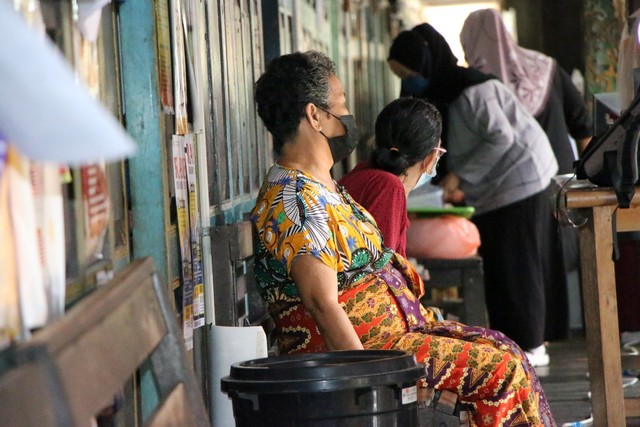
“As I experience it now, I believe that if our commitment or empathy is not tremendous enough, we won’t be able to provide the best service,” she adds.
Empowering Target Groups
In line with its mission of “integrating the perspectives of women and society into the mainstream of national development and strengthen the family institution towards improving social welfare”, KPWKM and its agencies have been implementing various initiatives that are designed to enhance the well-being of its target groups.
For instance, Talian Kasih 15999, a toll-free, 24-hour integration line serves as a single point of contact for target groups to relay any enquiry, complaint or request for help relating to their well-being for the ministry to receive and handle them.
These can include child and women abuse, counselling, homelessness, protection, welfare, baby dumping, reproductive health services, teenage social issues, disaster victims, OKU, the elderly, and human trafficking.
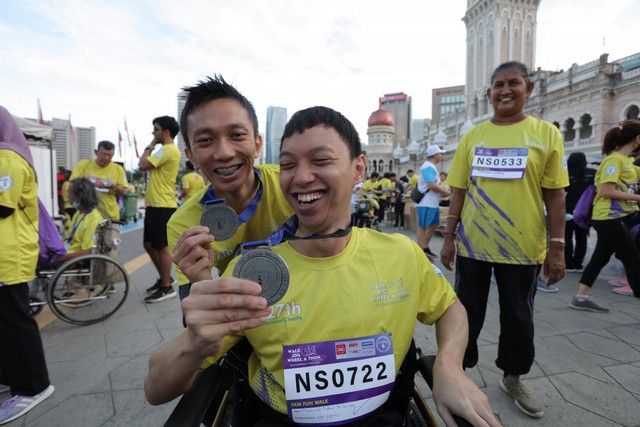
Starting 27 October 2021, OKUs in Malaysia can register online via MyDaftar OKU, upon which they will be provided with a digital card via QR code before obtaining the physical version. As of 31 January 2023, 637,537 of them have registered themselves in the disability registration system.
The initiative is part of KPWKM’s efforts to enhance the existing system that utilises the OKU Information System platform to make it more comprehensive and accurate, as well as to better facilitate the registration of more OKUs.
Ensuring its success is vital not only for the ministry through JKM to plan and provide suitable facilities that cater to the needs of OKUs, but also for OKUs themselves to gain benefits and assistance offered by government entities or private sectors.
Since Dato’ Sri Nancy began her tenure at KPWKM, a number of programmes have been carried out, focusing on boosting the socio-economic well-being of women.
Wanita Bangkit@KPWKM, for example, seeks to empower women across Malaysia, especially those who have lost their income, primary breadwinners and single mothers, to be financially and economically independent and improve their standard of living, subsequently contributing to the country’s economic growth.
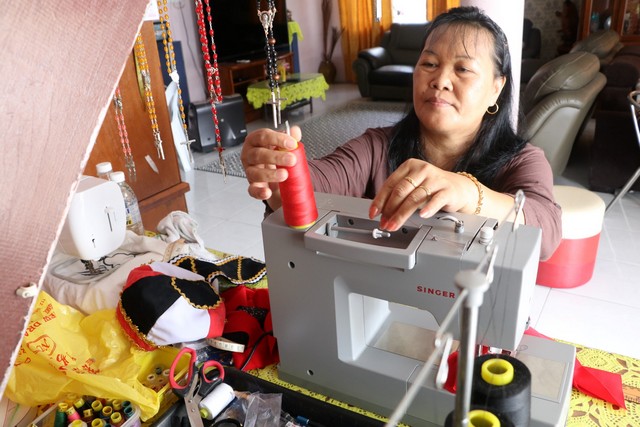
As of April 2023, there are 18,900 women who have participated in the programme, comprising various entrepreneurial training and courses and even psycho-educational support organised via strategic collaborations with other government agencies and departments as well as corporate companies.
In Sarawak, the ministry through Lembaga Penduduk dan Pembangunan Keluarga Negara (LPPKN) and Jabatan Kesihatan Negeri Sarawak have embarked on a pioneering collaboration with the implementation of the Gempur Saringan HPV DNA programme to promote early detection of cervical cancer.
The initiative is expected to be carried out throughout 2023 as a continuation of the institution’s women’s reproductive cancer awareness campaign that was launched in January that year.
Also known as WCaRe, it aims to increase awareness of all parties, especially women, on the importance of early screening to detect cervical cancer and breast cancer so that preventive measures and appropriate treatment can be implemented accordingly for those in need.
Strengthening Capability and Encouraging Collaboration
All initiatives catering to KPWKM’s target groups such as those mentioned above could not be achieved without the capable hands of staff members as well as volunteers of the ministry and relevant agencies.
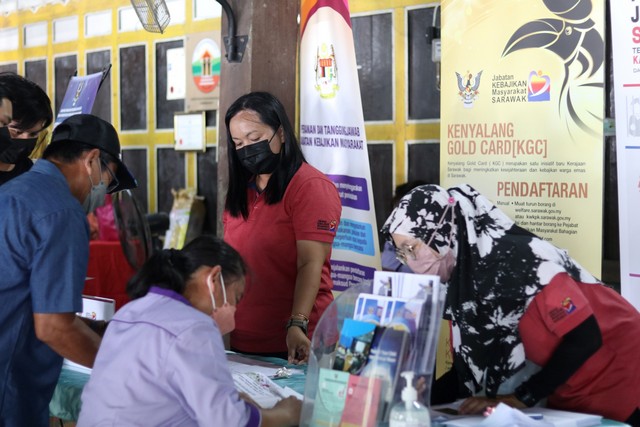
That, however, comes with its own set of challenges. The most prevalent is the hefty workload that they have to handle despite their ‘low’ educational level – be they diploma or even Form Five – which to Dato’ Sri Nancy is not an issue so long as their qualification is relevant to their job scope.
“But if they are not given assignments related to their qualification, it is going to be difficult for them to deal with cases that tend to be very sensitive and heart-wrenching.
“So imagine if you are a diploma holder or you just finished Form Five, and you are exposed to such emotionally demanding task. If you come to realise how taxing it is, what more to say when you are told to bear the burden of that work?” she illustrates.
Thus, to boost the efficiency of staff members and volunteers, the ministry has organised various workshops, courses and briefings for them to attend.
They focus on equipping them with the necessary knowledge, skills and attitude needed to perform in their jobs well, such as guidelines, standard operating procedures and laws that can impact the way they carry out their assignments.
Dato’ Sri Nancy adds that collaboration with ministries, agencies and departments other than KPWKM is also important when implementing its initiatives.
For instance, i-Sayang, which was launched in March this year, is an initiative by the ministry and the Employees Provident Fund (EPF) that enables husbands to voluntarily transfer two per cent of their EPF monthly contribution to their wives’ account.
Collaboration matters to Dato’ Sri Nancy because all ministries as part of the Government have to responsibility to ensure an inclusive and fair societal development in Malaysia, in line with the Sustainable Development Goals (SDGs) and elements of environmental, social and governance (ESG).
It also aligns with her belief that “quality begins at home” – in this context, the commitment to guarantee whatever efforts undertaken today in producing an empathetic and productive future generation have to start from the personal conviction of present leaders.
“For me it is a principle that I always hold on to. I also need the strong support of my friends in the Government as well as NGOs (non-governmental organisations) who can give their perspectives, advice and cooperation in our activities.
“So the society as a whole necessitate the solid support from all stakeholders in order to nurture responsible children – children who can be future leaders of their communities, the country, government, or whatever organisation that they are in,” she says.
Examples of Institutions Under KPWKM
One of the ways KPWKM cater to the needs of its wide-ranging target groups is through institutions managed by agencies under its purview. Among them are:
- Children’s Home (Rumah Kanak-kanak): An institution established under Section 54 of the Child Act 2001 dedicated to the care and protection of children. It aims to provide substitute care to children who have been neglected or abused, as well as to promote healthy physical, emotional and mental growth within a harmonious family environment. In Sarawak, it is located at Jalan Kuching-Serian, Kuching.
- Sekolah Tunas Bakti: Established under Section 65 (Approved Schools) of the Child Act 2001 for the education, training and detention of children. They are designed to provide rehabilitation to those who have been involved in juvenile delinquency, and educate them to build up positive attitudes, form strong personalities and equip themselves with competencies sufficient for an independent life. In Sarawak, it is located at Jalan Datuk Mohamed Musa, Kota Samarahan.
- KafeTEEN: A modern youth centre provided by LPPKN to help youths aged 13 to 24 go through their adolescence comfortably and confidently via education and skills development activities, counselling services and reproductive health advice services. There is one KafeTEEN in Sarawak, located in the town of Simanggang, Sri Aman.
- Klinik Nur Sejahtera: A healthcare clinic under LPPKN, offering services such as women’s well-being screening, consultation services and family planning services. Three of these clinics can be found in Sarawak, specifically Kuching, Sibu and Miri.
- Anjung Kasih: A temporary accommodation provided by Yayasan Kebajikan Negara for family members of patients who are receiving treatment in government hospitals. In Sarawak, they are available at Sarawak General Hospital, Kuching; Sibu Hospital; and Miri Hospital.
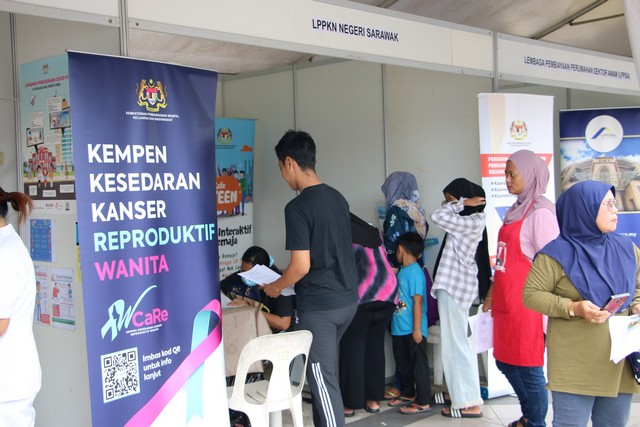
Sources: Jabatan Kebajikan Masyarakat (https://www.jkm.gov.my/), Lembaga Penduduk dan Pembangunan Keluarga Negara (https://www.lppkn.gov.my/), Yayasan Kebajikan Negara (https://yknm.org.my/)





